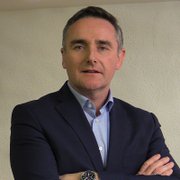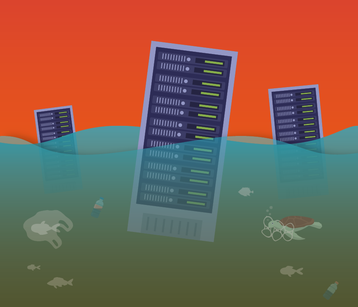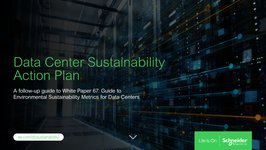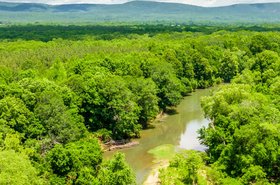A recent article in The Economist put it quite succinctly: “The dream of a planet of almost 8 billion people all living in material comfort will be unachievable if it is based on an economy powered by coal, oil, and natural gas.” There you have it, and quite apart from the “dream,” I would contend, even the status quo where a portion of the plant live in material comfort is going to come under strain.
There are so many recent data points to highlight (e.g., ice loss, ocean water temperature rising, etc.) and climate-exacerbated events ranging from the flooding this past summer in Western Europe, to the mega-wildfires turning forests into net-carbon emitters around the world that confirm the impact of human activity on the environment since the dawn of industrialization.
With the backdrop of COP26, we will be bombarded with newsfeeds and commentary throughout the event and beyond. There is a significant weight of expectation and perhaps some hope that promises and commitments can be quickly converted into something tangible. It’s not going to be easy; the sacrifice will be hard to sell, and the consequence will not be felt equally by all.
As august bodies like the Conference of Parties (COP), International Energy Agency (IEA), and the Intergovernmental Panel on Climate Change (IPCC) paint the picture of what we need to do to secure our future, we need to steel ourselves for some uncomfortable change. In that context, we need to be mindful of is where we obtain our information from, depending on social media feeds and industry-specific narratives may well condition us to believe the challenge is under control, that we are in a good position to use technology to meet the challenge, or that ultimately human innovation will prevail (more on that later).
Do we know what ‘good’ looks like?
This may well be the decade to define what our future generations inherit, but I don’t feel I’m aware of the challenge in its broadest sense. Here is an example: I believed that when we recycle clothes, we are being sustainable, or at least supporting a sustainable objective. Look a little deeper into how landfills in the developing world are bursting at the seams (pun intended) with our “recycled” clothes, however, and the reality is sobering. In many cases, we are just shipping the problem to those least able to deal with it; just search for news on Dandora Landfill in Kenya, for instance.
With all of this in mind, I have concluded we need to really test ourselves on our awareness of the climate change narrative and sustainability more generally. I’ve been thinking about how objectively informed I am, even with all of the information and connectivity at my fingertips. Yet, the question persists: have we looked critically at the science and the progress on sustainability generally? Or perhaps are we only looking at the narrow set of elements that we feel a direct relationship toward – in my case digital infrastructure, home recycling, and fuel consumption?
Let’s go “wide-angle”
Sustainability is a broader topic than just carbon; if you want a fuller picture, look no further than the comprehensive UN Sustainable Development Goals (SDGs). Many of the organizations you and I work for already embrace the SDGs in their overall sustainability or environmental, social, and governance (ESG) reporting. While the SDGs have been accused of being unwieldy from a metric and reporting perspective, they do at least propose a minimum outline of what we need to consider in terms of human behavior and how to preserve the viability of humanity. To truly move humanity to a sustainable footing for the future, we have to bring more than carbon reduction to the table. We also need to be mindful of justice, equality, and the sharing of the planet’s resources.
The road to net-zero is going to be difficult, and it will require change and sacrifice. Our global economic model is underpinned by consumption, and it’s becoming clear that this model will need to change. We simply cannot continue to consume without consequence. With the backdrop of COP26, I intend to focus on my awareness of the topic; to that end, I have observed three dimensions that I personally want to consider in more detail:
- The echo chamber – We should be aware that some of our interactions with this topic are heightened by social media platforms, curated by algorithms that inform us based on what we like, our views, our income, and myriad other qualities. As a recent Wired article underscored, social media is essentially designed to feed and confirm your already confirmed bias and beliefs, so we need to become proactive at regulating our news feeds as well as thinking more critically about the content we consume. Let’s all challenge our assumptions and support solid, independent, investigative journalism to ensure we are seeing the widest perspective.
- #WeCanDoBetter – Sustainability and ethics are not always tightly bound. You can absolutely engage with brands that are technically sustainable from a resource perspective, for instance, but often employ questionable ethics – and vice versa. Our choices will drive change, and we need to educate ourselves to see through some of the marketing and hype (greenwashing anyone?) as well as fully understand the impact of that marketing. We have made huge progress in driving ethics and sustainability back through the industrial supply chain, and many of the large operators in our industry deserve credit for insisting on this transparency. it means we can reasonably expect the investments we make are not at the expense of anyone’s dignity.
- Transparency – The data center industry continues to deliver more and more service and value with moderate increases in overall energy demand. The industry has taken a leadership role in renewable integration, and arguably a lot of the progress being made in renewables is underwritten by some of the major players in the industry. Data centers are a significant power consumer and carbon emitter overall, however, and we will have government policy brought to bear on our operations. We will absolutely need industry-wide transparency of sustainability data to ensure we can credibly shape the policy that will shape our industry – and do so equitably. Our customers will demand more transparency, and will not be convinced by new “carbon instruments” alone.
The data center industry has unquestionably been an agent for positive change across several dimensions of sustainability. The data center industry supports many of the SDGs; we have been at the very center of economic growth for the past three decades; the data center industry has been a catalyst for renewable adoption in the developed world; and the industry has delivered some fantastic new career opportunities that were not even imagined three decades ago. I’m confident that there is plenty more to come, and the data center industry will be at the very core of how we run a sustainable planet without consuming the earth.
But some of our biases conspire against us dealing today with a catastrophe in the future. BBC Future did a really good summary a few years back that basically outlines why we are only wired to deal with the immediate – our biological “hardware” was optimized through evolution for the Savanah, after all. But as humans, we can overcome bias through education and alternative viewpoints, by updating our biological “software.” I intend to challenge my own bias, my preconceived views on sustainability to at least be better informed about what’s really under the hood. Join me in doing this as well.





